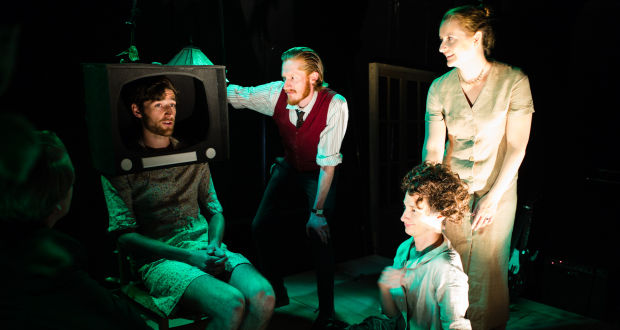Pros: A bleak but interesting snapshot of Britain in the late 50s.
Cons: A single theme dominates the storyline without much variation. A dated play that spends much time stating the obvious. An interesting analogy that hasn't been worked out as much as it deserves.
Summary
Rating
Poor
The story centres on Fred and Madge, a grey couple living a very grey existence. They bemoan their mundane lives but readily accept their occupations; Fred continually rolls a boulder up and down a hill while Madge sifts water. The couple gently bait each other with superficial observations about their relationship. Fred complains that he’s bored with the way Madge opens the door; she seems more concerned about shoes. Fred thinks pets might give them an interest in life, Madge recalls the time he tried to breed bats. He wonders whether locusts might be a good idea. Various characters stroll through the storyline: Queenie, their cross-dressing next door neighbour; Dr Petrie and his assistant, Miss Oldbourne, self dubbed professional insulters; and the mysterious Webber, who performs a mean version of Roy Orbison’s It’s Over. A ‘director’ occasionally jumps out of the audience to give Fred and Madge guidance and looks for support from a random ‘member’ of the audience. The story concludes with an Indian themed wedding complete with elephants.
I spent most of the two-hour show shrugging my shoulders. Yes, life can indeed be tedious. Rolling boulders and sifting water are clever analogies for life’s less rewarding moments, but the play doesn’t really move on from this basic premise. It comes as no surprise that the play was written in 1959. This was Britain trying to break free of post war austerity and Harold McMillan’s frosty brand of conservatism. That same year Colin MacInnes’ seminal work Absolute Beginners was published. He referred to ‘conscripts’, or adults, mugs and squares who bought into daily drudgery. Like millions of others, Fred and Madge are conscripts, who accept reality and work to make their lives less ordinary. It seems to me however, that for our parents and grandparents who lived through the era, life could never have been this bleak or humourless.
There is an inbuilt reverence for Joe Orton’s work and this play will be judged against his later output, which in some respects is unfair as Fred and Madge is essentially a first draft. It provides no more than a rough outline and consequently lacks substance. The cast are sound and professional but they cannot put in what the author left out. Had Orton still been alive, I doubt the play would’ve been staged like this: an interesting concept that hasn’t been worked out to the degree it deserves.
Author: Joe Orton
Director: Mary Franklin
Producer: Rough Haired Pointer and Adam Spreadbury-Maher
Box Office: 0207 478 0160
Booking Link:
Booking until: 18 October 2014
 Everything Theatre Reviews, interviews and news for theatre lovers, London and beyond
Everything Theatre Reviews, interviews and news for theatre lovers, London and beyond



